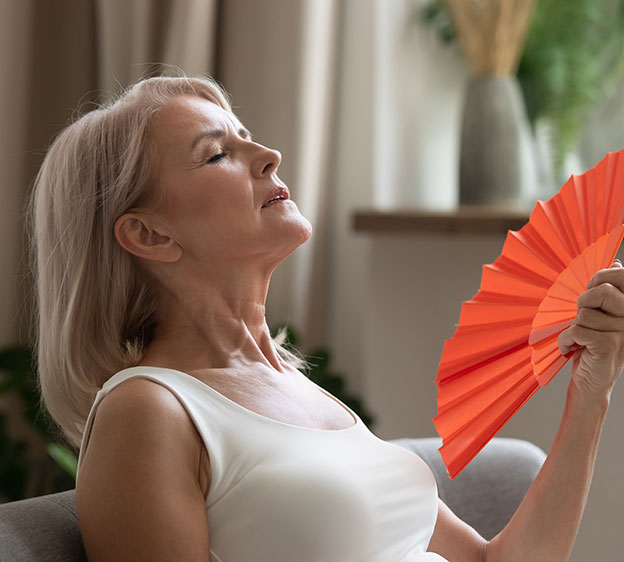
The menopausal transition brings a variety of changes to a woman's body, and one of the most well-known – and challenging – is hot flashes. This sudden rush of heat can leave you feeling uncomfortable, flushed and even drenched in sweat. For many, the accompanying night sweats can disrupt sleep and affect your overall quality of life. So, if you’re seeking quick ways to stop hot flashes in their tracks and regain control of your comfort, you’re not alone.
What Are Hot Flashes?
Hot flashes are one of the most common menopause symptoms. They are sudden feelings of intense heat that usually affect the face, neck and chest. The skin may redden, and a woman may begin to sweat, sometimes profusely. The body’s natural reaction to cool down — like increased sweating — can make you feel even more uncomfortable as your body temperature fluctuates quickly.
Though hot flashes can vary in intensity, duration and frequency, they typically last for a few minutes. Many women also experience night sweats, which are hot flashes that occur while sleeping and can severely disrupt rest.
Read More: Symptoms of Perimenopause: What You Need to Know
Why Do Hot Flashes Happen?
Hot flashes are thought to be triggered by hormonal changes, particularly the decline in estrogen levels during the years leading up to menopause and beyond. This hormonal shift affects the part of the brain that regulates temperature.
“Unfortunately, hot flashes are a very normal part of menopause,” says Dr. Curtis Elam, a board-certified physician with Beaufort Memorial Obstetrics & Gynecology Specialists. “Thankfully, there are ways to help you find relief from this unpleasant and annoying symptom.”
How Can I Stop Hot Flashes Naturally?
When you’re experiencing a hot flash, it’s tempting to look for an instant fix. While there’s no single answer, there are natural strategies that can help you reduce and prevent hot flashes. Here are some quick tips to consider:
- Consider your environment: Take cold showers and steer clear of hot tubs, saunas and warm climates.
- Drink cold water: When a hot flash begins, drinking cold water can help cool you from the inside out.
- Dress in layers: One of the simplest ways to manage hot flashes is to dress in layers. Looser-fitting clothing allows you to remove layers quickly and cool down when a flash strikes. Choose lightweight, breathable fabrics like cotton or moisture-wicking materials to help your body stay more relaxed.
- Stay cool: Keep your environment comfortable by running the air conditioner, using a fan or opening windows. When sleeping, consider products such as a cooling pillow or breathable bed linens, which have the potential to help manage hot flashes and night sweats.
- Watch your diet: Certain foods and beverages, like caffeine, alcohol and spicy food, can trigger hot flashes. Keeping a food diary might help you identify your personal triggers so that you can avoid them.
Lifestyle Changes to Manage Hot Flashes
While quick fixes can help in the moment, adopting longer-term lifestyle changes is essential for managing hot flashes daily. Here are some effective strategies:
- Exercise regularly: Exercise is a great way to reduce stress and improve your overall health, which may help reduce the frequency of menopause hot flashes. Incorporating activities like walking, yoga or swimming into your routine can support your body through this transitional time.
- Practice relaxation techniques: Stress may exacerbate hot flashes, so finding ways to relax is crucial. Practices like meditation, deep breathing and mindfulness may help lower your stress.
- Keep cool at night: Many women experience night sweats during menopause. To improve your quality of life, consider creating a sleep-friendly environment by keeping the bedroom cool, using lightweight bedding and wearing moisture-wicking sleepwear.
Read More: Menopause Treatments to Ease One of Life’s Inevitable Transitions
Medical Treatments for Hot Flashes
If natural remedies aren’t enough, there are other treatment options that may help. Talk to your OBGYN provider about these, especially if hot flashes affect your daily activities and well-being. Some medical options include:
- Cognitive behavioral therapy (CBT): CBT, a form of talk therapy, has been found to help women cope with the emotional and psychological aspects of problematic menopause symptoms. CBT doesn’t stop hot flashes from occurring but can improve how you manage them.
- Hormone therapy: Estrogen replacement therapy is one of the most effective treatments for hot flashes. However, it’s not suitable for everyone and may come with risks or side effects that must be carefully considered.
- Non-hormonal medications: For women who cannot or choose not to use hormone therapy, there are effective treatments such as certain antidepressants, blood pressure medications and anti-seizure drugs that have been shown to help manage hot flashes.
When to Ask for Help
It’s important to talk to an OBGYN or primary care provider if your hot flashes are severe or are impacting your quality of life. They can help you explore natural and medical treatments that might work for you. Remember that every woman’s experience is different, and what works for one person may not work for another.
Hot flashes are a natural part of menopause, but that doesn’t mean you have to suffer through them.
If you’re suffering from hot flashes or other symptoms of menopause, request an appointment with an OBGYN.

